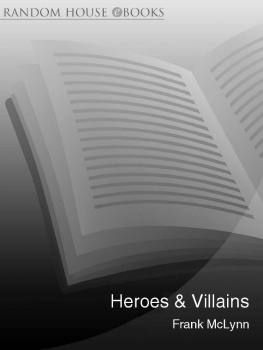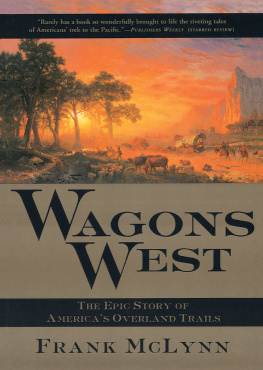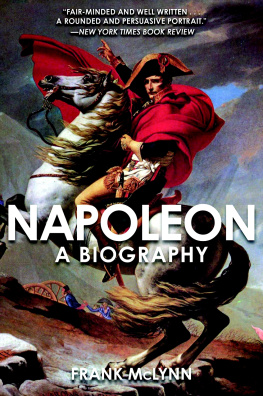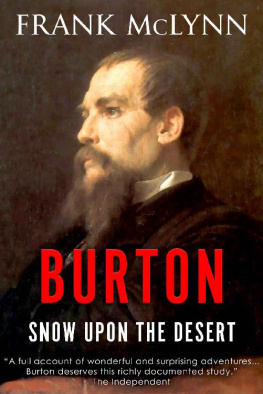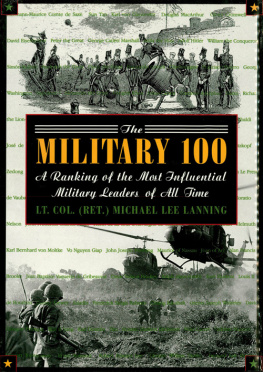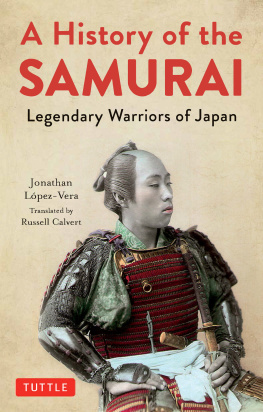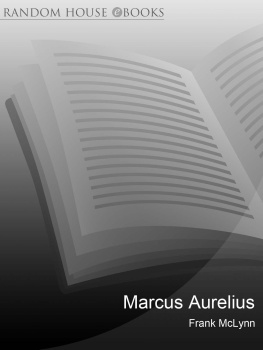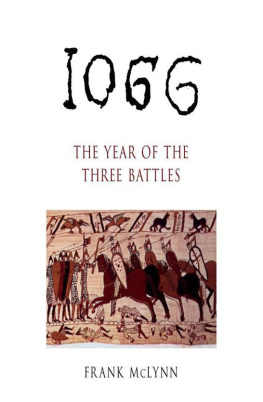Heroes & Villains
Inside the Minds of the Greatest Warriors in History
F RANK M C L YNN

Contents
The greatest warriors in history
The gladiator who brought Rome to its knees
The Mafioso-warrior
Englands greatest warrior-king
The renegade Conquistador
Japan s legendary Shogun
The master tactician and military genius
The psychology of the warriors
This eBook is copyright material and must not be copied, reproduced, transferred, distributed, leased, licensed or publicly performed or used in any way except as specifically permitted in writing by the publishers, as allowed under the terms and conditions under which it was purchased or as strictly permitted by applicable copyright law. Any unauthorised distribution or use of this text may be a direct infringement of the authors and publishers rights and those responsible may be liable in law accordingly.
Version 1.0
Epub ISBN 9781409070344
www.randomhouse.co.uk
This book is published to accompany the television series entitled
Heroes & Villains, first broadcast on BBC1 in 2007.
10 9 8 7 6 5 4 3 2 1
Published in 2007 by BBC Books, an imprint of Ebury Publishing, A Random House Group Company.
Copyright Frank McLynn 2007
Frank McLynn has asserted his right to be identified as the author of this Work in accordance with the Copyright, Designs and Patents Act 1988
All rights reserved. No part of this publication may be reproduced, stored in a retrieval system, or transmitted in any form or by any means, electronic, mechanical, photocopying, recording or otherwise, without the prior permission of the copyright owner.
The Random House Group Limited Reg. No. 954009
Addresses for companies within the Random House Group can be found at www.randomhouse.co.uk
A CIP catalogue record for this book is available from the British Library.
ISBN 978 1 846 07240 6
The Random House Group Limited supports The Forest Stewardship Council (FSC), the leading international forest certification organisation. All our titles that are printed on Greenpeace approved FSC certified paper carry the FSC logo. Our paper procurement policy can be found at www.rbooks.co.uk/environment
Commissioning editor: Martin Redfern
Project editor: Eleanor Maxfield
Copy-editor: Helen Armitage
Designer: Martin Hendry
Picture researcher: Sarah Hopper
Production controller: Antony Heller
Printed and bound in England by Clays Ltd, St Ives PLC
Dedication
For Professor Roger Kirby,
without whom this book
would not have been possible
Introduction
The greatest warriors in history
T HE RESPONSE OF NORMAL people to the great warriors of history is bound to be ambivalent. On the one hand, we admire their skill, ingenuity and brilliance. On the other, we worry about the human cost of their achievements. A leading scholar of Chinese language and history once told me he could never become interested in the Mongols, as their main contribution to the story of mankind was a mountain of skulls. Another common, but deeply erroneous, prejudice is that military intelligence is an oxymoron. We can admire painters, poets, composers, writers and even statesmen, but never soldiers. But there is a genuine problem here, because the mentality and psychology of warriors is bound to differentiate them from most other humans. One is reminded of the famous exchange between F. Scott Fitzgerald and Ernest Hemingway. Seeking to probe the essential psychology of the multimillionaire, a puzzled Fitzgerald remarked: The rich are not like us, to which Hemingway replied: No, they have more money.
Hemingways blunt pragmatism is usually applauded, but his answer was actually an evasion of the serious point his friend raised. Something similar applies to the world of the warrior. To dismiss the great captains of history as mere butchers is one-dimensional, but to say wherein their great quality consists is more difficult. In seeking to answer this question, it would be easy to concentrate on Europe, or at best on Eurasia, for this has been the home of all the most legendary warriors: Alexander the Great, Hannibal, Julius Caesar, Tamerlane, Subudei. Our approach in this book is different. We have explored over two thousand years of history and dealt with cultures ranging from Mexico to Japan. Whatever other faults the volume may contain, it is hoped that parochialism is not one of them.
Trying to penetrate the minds of historys great leaders is something that can be done only gradually and with great patience. But if asked to pin down one essential prerequisite for all successful warriors, I would reply that it is an extraordinary capacity for dealing with simultaneous and accumulated stress. The great captains had to deal with conflicts in society and the outer world, with other people and often within themselves. Spartacus, the leader of a slave revolt, not only had to fight the Romans but also to handle opposition from his own commanders, with treachery from renegades, with desertion by his allies (particularly the Cilician pirates) and especially with the doubts that must constantly have been in his mind about the feasibility of his great revolt. Attila the Hun had to deal politically with two very different halves of a divided Roman empire, with traitors and multiple assassination attempts and even strong opposition from his own brother, while negotiating the labyrinth of European politics in the fifth century AD. AS king and ruler of an empire, Richard the Lionheart should have been in better case, but on the Third Crusade he faced not only Saladin and the Saracens but also enmity and endemic factionalism in the crusading army, nativist opposition from Christian rulers in Palestine and, most of all, vehement hatred and intrigue in Europe, both from his treacherous brother John and from other European monarchs who conspired to kidnap him. Corts had to defeat the Aztecs while not alienating his Indian allies, especially the all-important Tlaxcalans, had to humour the Church, which did not always approve of his barbarism, deal with threats to his position from other Spanish grandees both inside and outside his army of conquest, and suffer the trauma of seeing dear comrades haled off to human sacrifice on Mexican altars. Tokugawa Ieyasu battled not just with his rivals for supreme mastery in Japan but also with Jesuits, recalcitrant Buddhist priests, the imperial court and even his own wayward son. Most of all, he had to wrestle with internal demons that plagued him ever since, at the age of seven, he saw his own father beheaded. Napoleon, while defeating the British and a raft of allies, easily swatted aside intrigues from his own side, loathing of old acquaintances from Corsica, plus envy and sibling rivalry from his brothers. But on top of this, he had to deal with his own divided self a sensibility torn between mathematical rationalism on the one hand and romantic dreaming and fantasy on the other. When it comes to warriors, the oldest wisdom of all is still valid. We do not necessarily forgive all when we understand all, but we do see them as human beings, both brilliantly talented and deeply flawed.
C HAPTER 1
Spartacus
The gladiator who brought Rome to its knees
S PARTACUS IS UNIQUE among the warriors of the ancient world, and of most other worlds as well. As Karl Marx said: Spartacus emerges as one of the best characters in the whole of ancient history. Most of the great captains of history achieved what they did for power, money, fame and fortune. Alexander the Great said that if he ran out of worlds to conquer he would compete against himself. Egotism, in a word, is usually the key to military achievement. But Spartacus fought to rid himself of a slaves shackles, to be a free man and to enable the other wretched of the earth to be free of the Roman yoke too. This is why Voltaire famously stated that Spartacuss rebellion was a just war, indeed the only just war in history. And that too is why Spartacus has been such an inspiration down the ages. The great conquerors emulate each other. Julius Caesar is said to have wept at the age of 33, when he reflected that at that age Alexander had already conquered the known world while he himself had barely started on his career. Napoleon too dreamed of conquests in the East that would put his name on a par with Alexanders. Yet those who turn to Spartacus are those who are prepared to die for others: Toussaint LOuverture in Haiti, Nat Turner in the American South, John Brown at Harpers Ferry, Che Guevara in Bolivia, all of whom perished, like Spartacus, in a bid to end outright slavery or its close cousin, serfdom.

